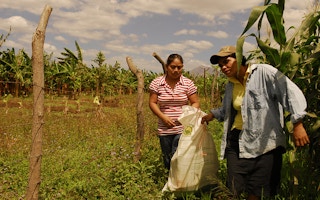A lack of progress on agricultural issues at the U.N. climate talks in Morocco puts at risk efforts to help farmers adapt to climate change and meet a global goal to end hunger by 2030, the head of the U.N. Food and Agriculture Organization said on Wednesday.
Ahead of the negotiations, which are due to end on Friday, development agencies had hoped for the establishment of a work plan on agriculture that would pave the way for more concrete discussions on assistance for struggling small-scale farmers.
But governments have failed to agree on that, and plan to push a decision to next year. The impasse has happened even though the new global climate deal, crafted in Paris in 2015, recognises the importance of food security for the first time.
“We had been working since Paris… to push agriculture to be at the centre of this meeting (in Marrakesh),” said José Graziano da Silva, director-general of the Food and Agriculture Organization (FAO). “It is very disappointing.”
Rich nations have long pressured developing countries to address ways to curb planet-warming emissions from their farms, while poorer states would rather focus on how farmers can adjust to rising temperatures and worsening droughts and floods.
Graziano da Silva said the talks in Marrakesh had mainly rehashed old arguments. A division between cutting emissions and adaptation to climate change “does not apply to agriculture”, he said in an interview on the sidelines of the negotiations.
When farmers choose a new crop variety that is more resistant to weather extremes or pests, they are adapting to changing conditions. That variety may also help fix nitrogen in the soil to improve fertility and reduce the use of chemicals - a way to emit fewer greenhouse gases.
“It’s only one seed” doing both jobs, he said.
The Brazilian agronomist told an event on ending hunger in a changing climate that the debate over whether to focus on cutting emissions or adapting to climate impacts had “paralysed decisions here” and was “just an excuse not to go to the real point: who will finance?”
More cash needed
Ethel Sennhauser, director of the World Bank’s agriculture global practice, noted that only 2 to 3 percent of international climate finance is allocated to agriculture, while the farm sector, forestry and associated changes in land use account for around a quarter of global emissions.
Graziano da Silva told the Thomson Reuters Foundation the low proportion of funding for agriculture was “unbelievable”.
“We need to find ways to solve that,” he added.
New sources of finance, such as the $10 billion Green Climate Fund, were needed to provide assistance to the farm sector in developing countries, he said.
Technologies and knowledge to help small-scale farmers adapt to climate change already exist, he added.
Those range from hardier crop varieties that contain high levels of nutrients to improve health, to more efficient irrigation techniques and planting more trees on farms.
But the agricultural research and farmer outreach systems that were in place in developing states in the 1960s and 1970s have been largely dismantled, he noted.
“We need to rebuild all those things. That is where it is costly. That is where we need the funding because farmers will not do that alone,” he said. “They do not have the capacity.”
This article is republished from the Thomson Reuters Foundation, the charitable arm of Thomson Reuters, that covers humanitarian news, women’s rights, trafficking, property rights and climate change. Visit http://news.trust.org.










